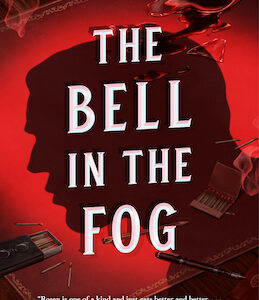There is something grizzled, world-weary, and wise about Charlie Cale (Natasha Lyonne), the protagonist of Poker Face, Peacock’s new ten episode detective series developed by Lyonne and writer-director Rian Johnson. She is a compact amalgam of a whole TV guide’s worth of ultra-cool, unpretentious detective characters. Both odd and slick, kooky and badass, spacy and focused, she has the canny, street-smart aura and vaguely Brooklyn dialect of Frank Columbo, the laconic, chill sensibilities and trailer-living habits of Jim Rockford, and the outwardly-rumpled appearance and insouciant supermarket-shopping patterns of Jeffrey “the Dude” Lebowski.
Like all those guys, Charlie lives life on her own terms. She wants to enjoy it, but isn’t interested in going to grand lengths to do so. She works as a cocktail waitress on a Las Vegas casino floor, drinks beer in a lawn chair in her desert backyard before her shifts, and looks after her motley friends and neighbors with a wry but caring air. In the first episode, a character offers her a job that could make her rich. “I’ve been rich,” she says, disinterested. “It’s easier than being poor, harder than doing just fine.”
She has a unique talent—a flawless ability to tell when someone is lying—and this has brought her great success and also great reckoning. Charlie is a former poker champion, blackballed from tournaments after rumors spread about how she was able to win so consistently. But she doesn’t mind where she has ended up. She works, she rests. It’s a simple life and there’s nothing wrong with that.
But when a good friend and fellow casino employee named Natalie (Dascha Polanco) winds up dead, she is moved to investigate. She cares deeply about her friend and knows in her gut that something is off about the circumstances of her death. But when she does solve things, her life becomes a bit complicated, and she hops into her Plymouth Barracuda and hits the road.
Poker Face is an hour-long, case-of-the-week mystery series, so each town Charlie visits leads to a new case, new characters. She sort of can’t help but look into things that seem to be suspicious; she wants to lend a hand to those around her, but she’s also scratching an itch. If someone lies to her, she knows it, and she has to figure out why.
The episodes are laced together by the simple act of pursuit; Charlie’s on the run, kinda—hunted by a wealthy family’s in-house fixer, Cliff Legrande (a wonderfully menacing Benjamin Bratt). Like Dr. Richard Kimble in the show The Fugitive, just as much as we want her to stick around the watering holes where she makes friends and solves crimes, we also know she’s gotta get the hell out before Cliff catches up to her.
The gambit of Poker Face is simple and tight, but the show itself is flamboyantly fun. This is partially because it resurrects Golden Age detective TV tropes. Notably, Poker Face is, to use a term coined by Philip MacDonald in 1963, a “howcatchem” (as opposed to “whodunnit”), a variety of mystery plot in which the audience sees the murder and knows who the killer is, and then watches the detective figure it all out. Johnson’s experimentation with this genre variation proves a neat counterweight to his recent forays into whodunnits (the star-studded Knives Out and its sequel, Glass Onion) which are nostalgic case studies of the traditional mystery. Although “howcatchem” plots date back to at least the Lord Peter Wimsey mysteries of the 1920s and 30s, they most prominently featured in episodes of Columbo, which were almost mini-movies that made its villains the episodes’ protagonists, and as such, attracted a host of distinguished guest stars.
The same is true for Poker Face; the first episode revolves around a character played by Adrien Brody, while later episodes feature performances from Hong Chau, Joseph Gordon-Levitt, Lil Rel Howery, and Ron Perlman, Stephanie Hsu, Tim Blake Nelson, Nick Nolte, Ellen Barkin, Megan Suri, Judith Light, Jameela Jamil, Tim Meadows, Clea DuVall, Chloë Sevigny, and Brandon Micheal Hall.
Johnson says he was inspired by “hourlong, star-driven, case-of-the-week shows,” including “Quantum Leap,” “The A-Team,” “Highway to Heaven” and even “The Incredible Hulk,” ones with “the anchoring presence of a charismatic lead and a different set of guest stars and, in many cases, a totally different location, every single week.”
The desire to emulate one’s favorite entertainment from a past era isn’t enough to elevate a project, though; in fact, new stories that owe too much to their predecessors easily end up encumbered by them, or paling in comparison to them. But Poker Face doesn’t suffer this fate, mostly due to the distinct charms of Natasha Lyonne, whose mildly-wackadoo, somewhat rough-edged, occasionally-wisecracking Charlie feels more like an extension of Lyonne’s own onscreen persona (hello Russian Doll) rather than a knockoff of a beloved TV PI. Also, obviously, Lyonne is a woman, and we don’t get spaced-out, oddball lady detectives as much as we deserve to, so she can’t help but feel novel.
Lyonne is a very earnest performer; crucial to a character who can read bluffs and deceit in others, she is unfailingly sincere. Even amid the (slight) shenanigans, she is genuine and true. A friend says that if she had been born in another time, she might have been a knight. Her motivations for embarking on her PI career are also selfless; in contrast with shows like Search Party or Only Murders in the Building where people try to solve crimes because of something missing or broken inside them (rather than guided by a sense of morality or justice), Charlie’s journey isn’t metaphorical or psychological in the least. She doesn’t “find herself” or find meaning or discover potential or anything like that. She doesn’t need to change her life; she is more than content with it. She’s just good at reading people and wants to do right by them.
The series is set in the present-day, but it stays distinctly analog, cultivating a righteously 70s-patina, despite its characters using smart phones and reading clickbait. The orangey desert backdrop and brown dive bar wall-paneling do much for this texture, but the real crux of this vibe is how personal it is. Charlie is described as a “human lie detector.” She has a skill that supersedes the kind of forensic investigating or “hacking” that became so common around millennium-era procedurals. (AI doesn’t have anything on Charlie… yet.) It’s a show about the tangible… or rather, making the intangible tangible. Charlie drifts from place to place, making connections with people in communities, changing things (a little bit) for the better.
Poker Face is streaming on Peacock. The first four episodes aired on January 26th, 2023. The remaining six will stream weekly on Thursdays.

















